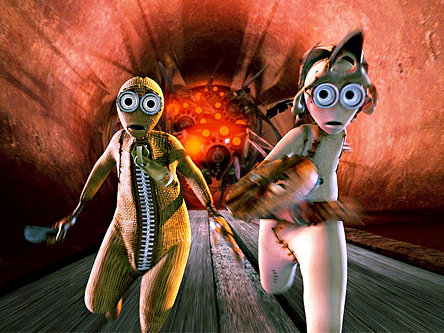Bayside resident Mark Metcalf is an actor who has worked in movies, TV and on the stage. He is best known for his work in "Animal House," "Buffy the Vampire Slayer" and "Seinfeld."
In addition to his work on screen, Metcalf is involved with Milwaukee Film, First Stage Children's Theater and a number of other projects, including comicwonder.com. He recently filmed an episode of the popular AMC series "Mad Men."
He also finds time to write about movies for OnMilwaukee.com. This week, Metcalf weighs in on "9" and "The September Issue."
9
Tim Burton was one of the many producers on this film. He did not direct it. There are a couple of moments that have Tim Burton all over them, but most of the film does not.
"9" is a doll made from burlap and mysterious electronics. There are others like him. They are all that is left in a post-apocalyptic world after the machines and the humans have killed each other. That scenario should sound familiar. It echoes at us from countless science fiction films since Hal took command of the ship in "2001: A Space Odyssey." Since progress and the industrial age began to ruin the planet, it is one of our greatest fears that the things we build to make things easier for us will eventually prove our downfall. I would say that it is a justified concern.
The same scientist who created the greatest machine, "The Brain," the machine that began the war of the machines, made the dolls. He realized his mistake and created the dolls into which he put pieces of his soul before he succumbed to what we all succumb to, as all humans in this cinematic world have, to death. The dolls have to save each other and unite the soul of the scientist. There has to be intentional irony in the fact that the name of the actor who voices the scientist is Oppenheimer. But it may be the only intentional irony.
The story is sappy and predictable. There are several action, or chase sequences that look as though they were designed with the video game in mind. That is evident in a lot of movies lately where the film seems less like a movie and more like a marketing tool for a game that will be in retail stores almost before you know it. None of them are very interesting, because they do not to move the story forward. In fact they forget the story altogether and it is always the story that we, as audience will come back to.
It is too bad that the story falls short, because the animation is very good. The art is original and compelling. When I was growing up, all cartoons looked pretty much the same. Same colors. Same goofy looking characters. Same five or six expressions. Now, because they can do everything inside the computer, there seems to be a huge range of color and texture available. And this leads to a full range of expression.
What Pixar has done, since "Toy Story" broke it open, is lead a kind of revolution in feature-length cartoon films. In each film, they apply a new color palette, a new sense of space and a new relationship between the characters, and a barrage of texture and detail, but everything is driven by a unique and unusual story. "Wall-E" is visually stunning and uses hardly any dialogue until the film is half over, but all of that innovation is spawned by a story that is boldly allegorical and makes a very clear moral statement that is linked to a political situation. "Up" also has a beautiful story that appeals to an older generation as well as to high school students who began watching Pixar films when they were little.
"9" has beautiful animation. The detail and the texturing, the color, and the range of expression that the little burlap dolls are capable of is better than anything I have seen. It is even at the service of a nice premise, the beginnings of a good story. But it stops there. The story is not developed and the characters come to a standstill while unimaginative chases take place. When the story resumes everything has been reduced to a predictable stereotype and it fails.
THE SEPTEMBER ISSUE
This is a documentary about the people who make the September issue of American Vogue Magazine. In particular Anna Wintour, the editor-in-chief, and Grace Coddington, the creative director. Fashion is something that I am fundamentally ignorant of; I don't know but I might even be a little proud of the fact that I don't have the faintest idea what is the right thing to wear this year.
I have an open and avowed disdain for the selling of things. If I need it I'll go and get it. I'd rather not have someone try to convince me that I need it. I'll know and if I don't I'll live without it. But I am a known grouch and they say that one in eight American women purchase the September Issue and the other seven probably pick it up at their friend's house. Who knows what they think when they look at all those skinny, surly models who look more like weapons than they do like women?
The documentary moves along at a nice clip. It's funny, sometimes. The differences between Wintour and Coddington, who have been with the magazine for about the same length of time and count each other as friends, are the most interesting. Meryl Streep in "The Devil Wears Prada" made Wintour iconic. She is known as "The Ice Princess." Streep found the woman beneath the surface. The documentary does not.
"The September Issue" has Grace Coddington to bring warmth, humor and a heart to the brutal halls of fashion. She is so different from Wintour, so much more openly passionate about her work, so much more willing to work with others, and so much more of this earth. And, she seems to be willing to forgive, to be flexible and very willing to speak her mind and open her heart. Because the documentary brings its focus to bear on Grace Coddington, it is hard to dismiss, even by someone like me who has an aversion to fashion.
Mark Metcalf is an actor and owner of Libby Montana restaurant in Mequon. Still active in Milwaukee theater, he's best known for his roles as Neidermeyer in "Animal House" and as The Maestro on "Seinfeld."
Originally from New Jersey, Metcalf now lives in Bayside.



